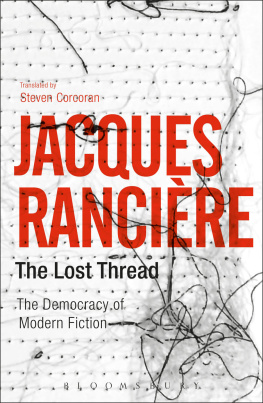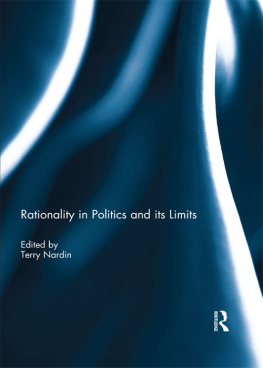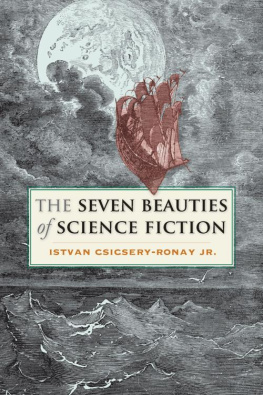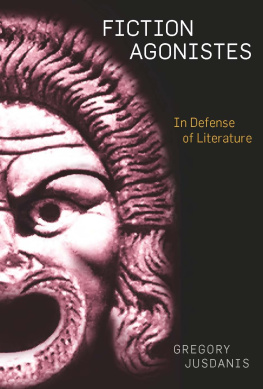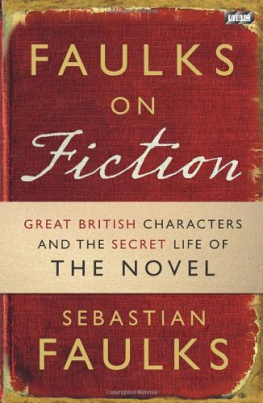
The Edges of Fiction
Jacques Rancire
Translated by Steve Corcoran
polity
Copyright page
First published in French as Les bords de la fiction Editions du Seuil, 2017
Collection La Librairie du XXIe sicle, sous la direction de Maurice Olender
This English edition Polity Press, 2020

Polity Press
65 Bridge Street
Cambridge CB2 1UR, UK
Polity Press
101 Station Landing
Suite 300
Medford, MA 02155, USA
All rights reserved. Except for the quotation of short passages for the purpose of criticism and review, no part of this publication may be reproduced, stored in a retrieval system or transmitted, in any form or by any means, electronic, mechanical, photocopying, recording or otherwise, without the prior permission of the publisher.
ISBN-13: 978-1-5095-3044-1
ISBN-13: 978-1-5095-3045-8 (pb)
A catalogue record for this book is available from the British Library.
Names: Ranciere, Jacques, author.
Title: The edges of fiction / Jacques Ranciere.
Other titles: Bords de la fiction. English
Description: Medford, MA : Polity, 2019. | First published in French as Les bords de la fiction (Paris : Editions du Seuil, 2017). | Includes bibliographical references and index.
Identifiers: LCCN 2019981534 (print) | LCCN 2019016715 (ebook) | ISBN 9781509530441 (hardback) | ISBN 9781509530458 (paperback) | ISBN 9781509530472 (epub)
Subjects: LCSH: Fiction. | Fiction--History and criticism--Theory, etc. | BISAC: LITERARY CRITICISM / Semiotics & Theory.
Classification: LCC PN3331 .R25713 2019 (ebook) | LCC PN3331 (print) | DDC 808.3--dc23
LC record available at https://lccn.loc.gov/2019981534
Typeset in 11 on 13pt Sabon
by Fakenham Prepress Solutions, Fakenham, Norfolk NR21 8NL
Printed and bound in Great Britain by TJ International Limited
The publisher has used its best endeavours to ensure that the URLs for external websites referred to in this book are correct and active at the time of going to press. However, the publisher has no responsibility for the websites and can make no guarantee that a site will remain live or that the content is or will remain appropriate.
Every effort has been made to trace all copyright holders, but if any have been overlooked the publisher will be pleased to include any necessary credits in any subsequent reprint or edition.
For further information on Polity, visit our website: politybooks.com
Acknowledgements
I wish to thank everyone who has provided impetus to this work and enabled me to outline its themes and contours. My gratitude goes first to Azucena Gonzlez Blanco and Erika Martnez, organizers of a conference on The Politics of Literature held in Granada in December 2014. I was able to pursue and discuss my reflections thanks to the invitations I received from various institutions: the University of California in Los Angeles and in Irvine, the Academy of Beaux-Arts in Dsseldorf, the Fondation Gulbenkian in Paris, the University of Toulouse-Jean Jaurs, the Monokl publishing house in Istanbul, the Philosophia festival in Saint-milion and the National University of Valparaiso. The talk I gave at Irvine was published as Fictions of Time in a collective volume, Rancire and Literature, edited by Grace Hellyer and Julian Murphet.
The Edges of Fiction (Les bords de la fiction) was the title first given to a talk held at the Fondation Gulbenkian in February 2016 and published by that institution. A first version of the chapter titled The Unimaginable was published, in 2014, in a special issue of the Cahier de lHerne on Joseph Conrad, edited by Josiane Paccaud-Huguet and Claude Maisonnat.
A first version of the chapter The Random Moment came out as The Politics of Fiction and, together with a picture by Alfredo Jaar, comprised issue No. 3 of LEstacio, published in Barcelona in May 2016.
All the other chapters of this book have never before been published.
Introduction
What distinguishes fiction from ordinary experience is not a lack of reality but a surfeit of rationality. That is the thesis formulated by Aristotle in the ninth chapter of the Poetics. Poetry, by which he means the construction of dramatic or epic fictions, is more philosophical than history because the latter says only how things happen, one after the other, in their particularity, whereas poetic fiction says how things can happen in general. Events do not occur in it at random. They occur as the necessary or verisimilar consequences of a chain of causes and effects. Such a chain can be shown to produce the most general determinations of human existence the fact of knowing happiness or misfortune, and of going from one to the other. This chain is no longer a fatality imposed by a divine power. It is inherent to the order of human action and to the relation it entertains with knowledge. Fictional reason carried out exactly this revolution: the tragic heros misfortune is no longer a condition to be endured but instead the consequence of an error of some error or other in the conduct of ones action and no longer a transgression of the divine order. And this misfortune occurs through a specific mode of causality. Indeed, this causal chain cannot be defined by rigour alone. Its effect must also be contrary to that which we are led to expect. The proper chain of causes and effects is attested by the reversal the peripeteia it produces in the universe of expectations. The rationality of fiction is that appearances or expectations, for in Greek the same word expresses both things are inverted. It is that one state leads to the inverse state and that, by the same token, something one was unaware of comes to be known. Prosperity and misfortune, the expected and the unexpected, ignorance and knowledge these three oppositions form the stable matrix of classic fictional reason in the West. The overall chain articulating them, says Aristotle, has two modalities: it can be necessary or verisimilar. However, practice shows that verisimilitude is charged with proving necessity.
The importance of the theoretical matrix thus constructed must not be overlooked. This model of fictional rationality is by no means limited in its principle to the inventions of poets. Its field of application can be extended to wherever what is at stake is to show the linking of causes and effects that leads beings, unbeknownst to themselves, from happiness to misfortune, or from misfortune to happiness. Our contemporaries no longer write tragedies in verse. Yet one may easily verify that even today the Aristotelian principles of fictional rationality form the stable matrix of the knowledge that our societies produce about themselves. In the great theories of society and history, as well as in the short-sighted, day-to-day oracular science of politicians, experts, journalists or essayists, the matter is still one of developing the chain of causality that leads us, has led us or will lead us to fortune or to misfortune. Accordingly, it is still a matter of showing how these causes produce their effects by inverting appearances and expectations, how prosperity awaits us at the end of an endured ordeal, or disaster at the end of illusions of happiness. It is thus a matter of showing how misfortune is the effect of an ignorance that is itself an object of knowledge. It is lastly a matter of showing all this within a discursive figure that equates necessity and verisimilitude. Marx, Freud and Braudel have taught us as much, each in their own way: the good science of human actions and conducts is recognizable in its faithfulness to the fundamental structures of fictional rationality the distinguishing of temporalities, the relationship between the known and the unknown, and the paradoxical chain of causes and effects. If the Bachelardian formula of scientific rationality, There is science only of the hidden, is so very similar to the reasoning of detective Rouletabille, it is because both share a common origin in the Aristotelian principle of paradoxical causality: truth is established as an inversion of what appearances have led us to expect.
Next page

